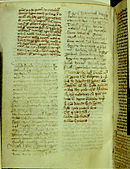- Lamentations of Mary (Old Hungarian)
-
The Old Hungarian Lamentations of Mary (OHLM) (Hungarian: Ómagyar Mária-siralom) is the oldest extant Hungarian poem, copied in about 1300 into a Latin codex, similarly to the first coherent written Hungarian text (Halotti beszéd; Funeral Oration), which was written down between 1192 and 1195. Its text is a translation or adaptation of a version of the poem or rather sequence beginning Planctus ante nescia... that was quite widespread in medieval Europe. The interpretation of OHLM has been a well-discussed topic in Hungarian philology; nevertheless, the explanation of a few words and phrases in it is still unsettled. Pais Dezső's interpretation is given there (obviously relying on earlier relevant results, too.)
The text of the poem
Original text Pronunciation (by Dezső Pais) Modern Hungarian (by Ferenc Molnár) English Volek syrolm thudothlon
syrolmol sepedyk.
buol ozuk epedek.Volék sirolm tudotlon.
Sirolmol sepedik,
buol oszuk, epedek,Nem ismertem a siralmat,
Most siralom sebez,
Fájdalom gyötör, epeszt.I did not know the lament yet,
Now lament gashes,
Ache lacerates, languishes.Walasth vylagumtul
sydou fyodumtul
ezes urumemtuul.Választ világumtuul,
zsidou fiodumtuul,
ézes ürümemtüül.Zsidók világosságomtól,
Elválasztanak fiamtól,
Édes örömemtől.Jews, from my light,
Separate me from my son,
My sweet delight.O en eses urodum
eggen yg fyodum,
syrou aniath thekunched
buabeleul kyniuhhad.Ó én ézes urodum,
eggyen-igy fiodum,
sírou anyát teküncsed,
buabeleül kinyuhhad!Én édes Uram,
Egyetlenegy fiam,
Síró anyát tekintsed,
Fájdalmából kivonjad!O my sweet Lord,
My only one son,
Look at the crying mother,
Withdraw her from her pain!
Scemem kunuel arad,
en iunhum buol farad
the werud hullothya
en iunhum olelothyaSzemem künyüel árad,
junhum buol fárad.
Te vérüd hullottya
én junhum olélottya.Szememből könny árad,
Szívem kíntól fárad,
Te véred hullása,
Szívem alélása.From my eyes tears are flooding,
My heart tires from torment,
Your blood's falling,
My heart's languishing.
Vylag uilaga
viragnac uiraga.
keseruen kynzathul
uos scegegkel werethul.Világ világa,
virágnak virága,
keserüen kinzatul,
vos szegekkel veretül!Világ világa,
Virágnak virága,
Keservesen kínoznak,
Vasszegekkel átvernek!
World's light,
Flower's flower,
They torment you bitterly,
They pierce you with iron nails!
Vh nequem en fyon
ezes mezuul
Scegenul scepsegud
wirud hioll wyzeul.Uh nekem, én fiom,
ézes mézüül,
szégyenül szépségüd,
vírüd hioll vizeül.Jaj nekem, én fiam,
Édes, mint a méz,
Megrútul szépséged,
Vízként hull véred!
Woe to me, my son,
Sweet as honey,
Your beauty turns to ugliness,
Your blood falls like water!
Syrolmom fuhazatum
therthetyk kyul
en iumhumnok bel bua
qui sumha nym kyul hyulSirolmom, fuhászatum
tertetik kiül,
én junhumnok bel bua,
ki sumha nim hiül.Siralmam, fohászkodásom
Láttatik kívül,
Szívem belső fájdalma
Soha nem enyhül.
My lament, my prayer,
Can be seen from outside,
My heart's inner ache
Never abates.
Wegh halal engumet
eggedum illen
maraggun urodum,
kyth wylag felleynVégy halál engümet,
eggyedűm íllyen,
maraggyun urodum,
kit világ féllyen!Végy halál engemet,
Egyetlenem éljen,
Maradjon meg Uram,
Kit a világ féljen!
Take me, death,
Let my only one to live,
Keep him, my Lord,
Whom the world should fear!
O ygoz symeonnok
bezzeg scouuo ere
en erzem ez buthuruth
kyt niha egyre.Ó, igoz Simeonnok
bezzeg szovo ére:
én érzem ez bútürüt,
kit níha egíre.Ó, az igaz Simeonnak
Biztos szava elért,
Érzem e fájdalom-tőrt,
Amit egykor jövendölt.
O for the just Simeon's
Certain word reached me,
I can feel this dagger of pain,
What long ago he foretold.
Tuled ualmun
de num ualallal
hul yg kynzassal,
Fyom halallal.Tüüled válnum;
de nüm valállal,
hul igy kinzassál,
fiom, halállal!Ne váljak el tőled,
Életben maradva,
Mikor így kínoznak
Fiam, halálra!
May I not be separated from you,
Staying alive,
When they are tormenting you,
My son, to death!
Sydou myth thez turuentelen
fyom merth hol byuntelen
fugwa huztuzwa
wklelue kethwe ulud.Zsidou, mit téssz türvéntelen,
Fiom mert hol biüntelen.
Fugvá, husztuzvá,
üklelvé, ketvé ülüd!Zsidó, mit tész, törvénytelen!
Fiam meghal, de bűntelen!
Megfogva, rángatva,
Öklözve, megkötve
Ölöd meg!
Jew, what you do is lawless!
My son died, but he is guiltless!
Clenched, hitched him,
Plummered, bound him,
You killed him!
Keguggethuk fyomnok
ne leg kegulm mogomnok
owog halal kynaal
anyath ezes fyaal
egembelu ullyetuk.Kegyüggyetük fiomnok,
ne légy kegyülm mogomnok!
Ovogy halál kináal
anyát ézes fiáal
egyembelű üllyétük!Kegyelmezzetek meg fiamnak,
Ne legyen kegyelem magamnak,
Avagy halál kínjával,
Anyát édes fiával
Együtt öljétek meg!Have mercy on my son,
No mercy for me,
Or with the torment of death,
The mother with her own son,
Kill them together!Categories:- History of the Hungarians
- Medieval Hungary
- Hungarian language
Wikimedia Foundation. 2010.

